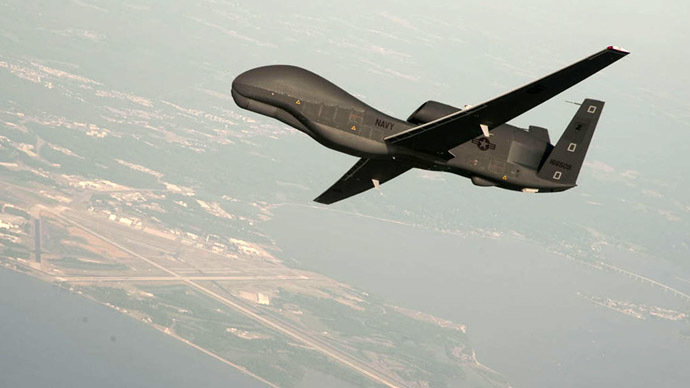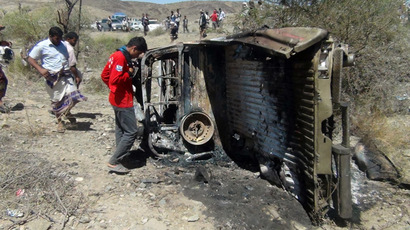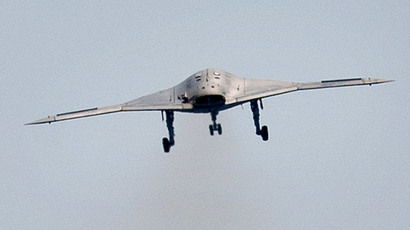Japan-based US drones to spy on China, N. Korea – report

Tokyo wants to buy several Global Hawk drones to monitor the Chinese and North Korean military, Japanese media reports. The US is deploying two of these large military drones to its base in Japan, despite protests and an absence of local air regulations.
The US Air Force plans to deploy two unmanned aerial vehicles
(UAVs) to Misawa Air Base as early as late May, The Yomiuri
Shimbun reports. According to the bilateral agreement officially
acknowledged by the Japanese Defense Ministry, the drones are to
stay there until October and may also be redeployed next year.
The base, located some 590 kilometers northeast of Tokyo, will
host 40-meter-wide, 14.5-meter-long Northrop Grumman RQ-4 Global
Hawk drones, which the US has previously used in military
operations in Iraq and Afghanistan. The reported grounds for the
relocation have been “more favorable weather conditions”
in the area than Guam’s, where the drones are currently
stationed.
However, a senior official source at Japan’s Air Self-Defense
Force (ASDF) has been more precise in defining the drones’ tasks
while they are in the country. The source also confirmed Japan
wants to get several Global Hawks of its own for reconnaissance.
“The Global Hawk provided us with a wealth of data, including
surveillance of the crippled reactors at Tokyo Electric Power
Co.’s Fukushima No. 1 nuclear power plant. The device will be
effective in surveying the activities North Korean and Chinese
military,” the source told The Yomiuri Shimbun.
A whole US-Japanese fleet of drones may be operating at Misawa
Air Base as early as 2015, “watching Chinese naval ship
movements in the South China Sea” and gathering other
intelligence in the region, according to the report. Tokyo said
earlier that it was concerned by Beijing’s operation of its
aircraft, including UAVs, in the region.

However, the problem that the Japanese government has to face is that no clear regulation on unmanned aerial vehicles exists in the country. The national law defines aircraft as an aerial vehicle “with a person on board,” and the only existing guidelines on fixed-wing drones were set by Japan’s UAV Association, saying they can only fly up to 150 meters above the ground over unpopulated areas.
Global Hawk drones have an operational altitude of up to 18,000 meters and can fly for 30 hours.
Japanese authorities have already notified operators of small planes and others flying near the Misawa Air Base to contact the Misawa control tower if their altitude is 6,100 meters or lower. Similar warnings have been made in regards to Sapporo.
According to Japanese media, the US can get away with flying their drones in Japan even without a regulatory law in place because of the Japan-US Security Treaty, while ASDF cannot.
This has not pleased some of the local residents, who in April marched in front of the Misawa Air Base to express their opposition to the deployment of US drones.
While some Japanese view the US forces stationed in the country as a protection against the “Chinese threat,” others still remember the atrocities committed by US servicemen in Japan, including the infamous 1995 Okinawa rape incident, in which a 12-year-old girl was raped by three soldiers.
Discussions on new flight safety regulations have reportedly been planned between Japanese ministries, but no details on when such legislation may be adopted have been revealed.














